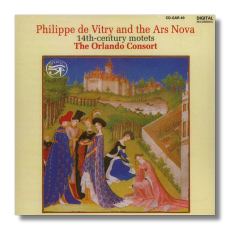
The Internet's Premier Classical Music Source
Related Links
- Latest Reviews
- More Reviews
-
By Composer
-
Collections
DVD & Blu-ray
Books
Concert Reviews
Articles/Interviews
Software
Audio
Search Amazon
Recommended Links
Site News
 CD Review
CD Review
Philippe de Vitry

Vitry and the Ars Nova
14th-Century Motets
- Philippe de Vitry:
- Almifonis melos/Rosa sine culpe spina
- Apta caro/Flos virginum/Alma redemptorisa mater
- Cum statua/Hugo/Magister invidie
- Flos ortus/Celsa cedrus
- Impudenter circumivi/Virtutis laudabilis/Alma
- O canenda/Rex quem/Contratenor/Rex regum
- Petre clemens/Lugentium
- Servant regem/O Philippe/Rex regum
- Tuba sacre fidei/In arboris/Virgo sum
- Vos quid admiramini/Gratissima/Gaude gloriosa
- Anonymous (French) :
- Aman novi probatur/Heu fortuna subdola
- Colla iugo subdere/Bona condit
- Douce playsence/Garison selon nature
- Firmissime fidem/Adesto sancta Trinitas
- Floret cum vana gloria/Florens vigor
- In virtute/Decens carmen
- Se je chant
- Trahunt in precipicia/Quasi non ministerium/Ve qui gregi
- Tribum que non abhorruit/Quoniam secta latronum
The Orlando Consort
Amon Ra CD-SAR49
'The flower and jewel of singers', 'the finest figure in the entire musical world', 'the outstanding prince of musicians, heir to Orpheus, whose name will live forever'… such contemporary views of Philippe de Vitry rightly suggest that his music (not so well known as it might be) is worthy of listening to. Born in 1291, probably in Champagne, he spent most of his life in the service of the royal administration and as Bishop of Meaux dying an accomplished poet, philosopher, cleric and mathematician to boot in 1361. Conjecture has it that this combination of skills and attendant predispositions towards both rigor and innovation, combined with drive and repute, enabled Vitry to play certainly a leading role, maybe a decisive one, in the changes that occurred in French music in the ten years or so before 1325; these changes were in three significant areas:
- the systems of notation were thoroughly revised
- a new form and technique of building the motet was arrived at
- a new language of harmony and counterpoint was developed for the motet
These developments resulted in the classic isorhythmic motet, which sets a pair of texts simultaneously in its two upper voices; the repeated rhythmic patterns of the tenor do not necessarily accord with melodic ones. Other strict 'regulations' of repetition (coincidence at prominent or significant textual junctures, for example) made for a rigorously-organized structure, following which was an intentional intellectual challenge. That Vitry was able to utilize this set of self-imposed restrictions to such effect and specifically to create music which also sounds so well is remarkable. But here is the evidence; it's plain that, for all the mathematics, the text comes first and the music is unforced and never distorted by the format. What's more, textual cross-referencing, allusions, symbols and thematic subtleties are packed into each short motet (most last a mere three minutes and none much longer than seven on this disc) more densely than in almost any other mediaeval form. This means that careful listening is a requirement if you want to get the most from the whole. Nothing arid or crossword puzzle-like here, though: this tight, colorful weave is one on which Machaut gazed, which he understood and then unpicked for himself.
Philippe de Vitry and the Ars Nova is a wonderful CD with almost an hour's worth of 19 motets from the first quarter of the fourteenth century reflecting the changes through which the genre passed. In fact, it's unclear exactly which of the works were composed by Vitry himself and which by members of his circle. The earliest group of four motets dates from right at the beginning of this period of change; they illustrate Le Roman Fauvel, which satirizes religious and political corruption and, from specific references, can be dated fairly certainly to shortly after 1315. The rest are from the 1320s: they concentrate on courtly life, abuse, fawning dependency at court and (other) such deviants as writers who compose incoherent texts (In virtute/Decens, tr.12; the two texts, separated by the oblique, are that pair set in the isorhythmic motet, described above) as well as personal attacks. The lovely Tuba/In arboris, Vos/Gratissima, Impudenter/Virtutibus, Flos/Celsa, Almifonis/Rosa and Apta/Flos are strictly religious, particularly Marian, motets, the latter being probably of a later date and certainly of the 'ars subtilior' (more subtle style) which characterized the second phase of the 'ars nova'. The theme of courtly love, otherwise ubiquitous at this time, is represented here by only one motet, Douce/Garison ; while one other 'frivolous' piece, Se je chant, has been included because it is so close to the Vitry school or style.
The Orlando Consort consists of a countertenor, two tenors and a baritone: their singing is near impeccable. This is music which they know well and sing from the soul. Where a certain 'spring' is needed, the Orlando Consort has it; where reticence, a tender pause; and where humor is called for, just the right, light touch of emphasis. Relaxed yet meticulously-articulated, their performance of each motet is a study in paying perfect attention to the individual line; this greatly helps the listener to follow the dual texts. Each singer's part nevertheless melds into a deeply musical ensemble. There seem times (in Tribum que non abhorruit/Quoniam secta latronum, for instance) when Robert Harre-Jones' countertenor is a little too closely miked compared with the other singers. Their performance is intimate, focused and ultimately very satisfying. Although the accompanying booklet has clear notes on the historical and musical background, the motets' texts are not included: a pity. Amazingly, there is no other CD in the current catalog devoted exclusively to Vitry, so if you want to know more about this important and interesting period of French musical development, this excellent CD is a must. Buy it with confidence.
Copyright © 2007, Mark Sealey





















